FDNY learning Mandarin
Updated: 2016-03-14 09:54
By HEZI JIANG(chinadaily.com.cn)
|
|||||||||
Lieutenant Charles Flores has been learning to cook Chinese since he was 15. At 60, the emergency medical worker has signed up for an even bigger challenge: learning to speak Chinese.
|
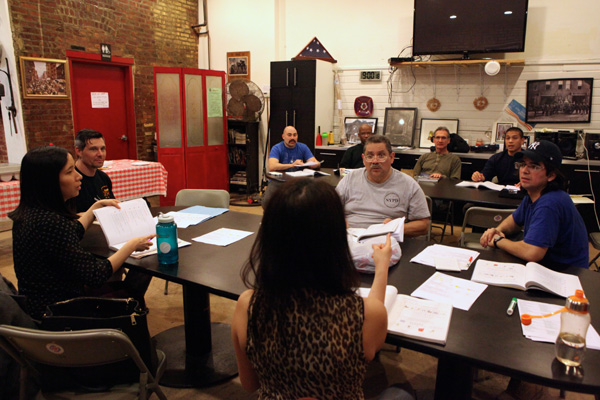 |
|
A class of New York City firefighters, EMTs and paramedics participate in a Mandarin language class leading by Lily Cheung at an old Brooklyn firehouse on March 10. Initiated by FDNY's Phoenix Society, a group of Asian-American first responders, it's the first language program ever funded by the New York City Fire Department Foundation. HEZI JIANG / CHINA DAILY |
Every Thursday, Flores and a handful of other New York City firefighters, EMTs and paramedics gather at an old Brooklyn firehouse to tackleMandarin one word at a time.
"Ni you yige mao ma?" (Do you have a cat?) Flores asked his classmate during the class on March 10.
"Mei-you,"(No), his colleague answered, then turned and asked the next student if he had an older brother.
The group meets two hours a week, led by Lily Cheung, a China-born software engineer. She encourages students to learn by speaking out loud.
To understand the language's structure, students practiced by arranging an English sentence in Mandarin sequence.
"Susan and I will watch a movie in Brooklyn tomorrow"becomes "Tomorrow I and Susan in Brooklyn watch a movie".
"Flawless,"Cheung said again and again.
Started by the FDNY's Phoenix Society, a group of Asian-American first responders, the class is the first language program ever funded by the New York City Fire Department Foundation.
New York City has the largest Chinese population of any city outside of Asia. With about 420,000 people speaking Mandarin. It has become the second-mostused non-English language after Spanish, according to the Census Bureau's American Community Survey.
The main purpose of the program is to better serve non-English speakers in the Chinese community, and the organizers hope to expand the classes into other Chinese dialects and Asian languages in the future.
There are only about 120 Asian Americans among the FDNY's 10,200firefighters, saidLieutenant Steven Lee, president of the Phoenix Society, who is also a student in the class.
"Probably only 40 of them are Chinese. And how many of them are fluent in the language?"
As the fire department continues to recruit more Asian Americans and the Phoenix Society works on getting the word out through activities such as forming a dragon boat team, Lee believes the language program will help to bridge the gap faster.
It also offers a rare chance to bring FDNY first responders from different jobs, boroughs and backgrounds under one roof, said Lee. The class is made up of both men and women who identify as Asians, Latinos, blacks and whites.
It takes Flores about 40 minutes to come from Staten Island. On a recent Thursday, he brought two dozen Chinese dumplings that he made from scratch, along with a bag of Mandarin oranges. The dumplings were served authentically with vinegar.
The dinner break allows the students to show off their cooking and also learn more about Chinese culture. Cheung recommended the popular Chinese film The Mermaidto the class.
The class started last September with 22 people coming to the first lesson, but only eight showed up on March 10.
Lee said many had to skip classes because of the busy work schedule of firefighters and other first responders, and it can be hard for them to catch up after missing a class or two.
"For those who are here, I give them a lot of credit. It's a big commitment,"Lee said. Doraun Ellis, a paramedic, was taking the train and walking to class during the coldest time of the winter.
The first group will graduate on March 31 with the second group starting on April 6. Lee said he had been thinking about offering the class twice a week.
The current students are welcome to come back to review the lessons and practice. "Confidence is the most important thing,"said Cheung. "The more comfortable you feel about the language, the more you will speak. The more you speak, the better your Chinese will be."
George Ebert, a Coney Island-based battalion chief, was amazed at how far a simple Mandarin word can take him.
When he goes a Chinese market or shop, he uses the basics —ni hao (Hello), zao an (Good morning) and wu an (Good afternoon).
"You can see their expressions change. It just opens it up and brings us closer,"said Ebert.
Today's Top News
Growth focus
Opening a window on rural China
Experts confident in growth objective
Clinton, Sanders spar over immigration
Scholar praises pragmatic government work report
China hits back at US over ZTE restrictions
Longer visas for foreign experts eyed to ease entry
China scholar praises pragmatic govt work report
Hot Topics
Lunar probe , China growth forecasts, Emission rules get tougher, China seen through 'colored lens', International board,
Editor's Picks
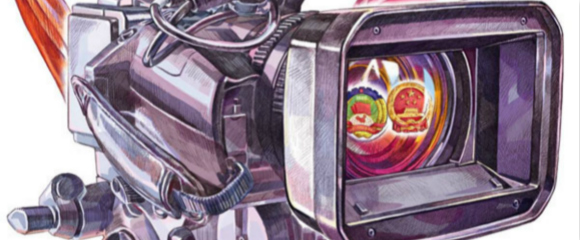
|
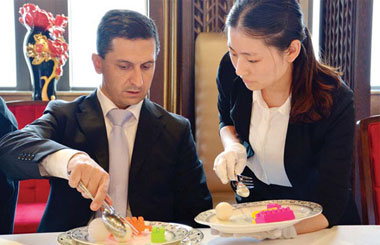
|

|
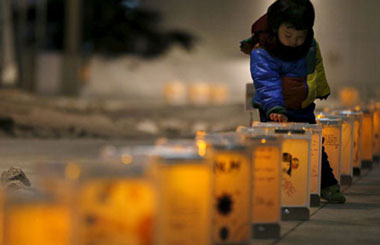
|
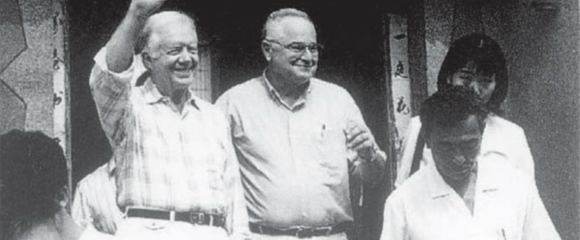
|

|






